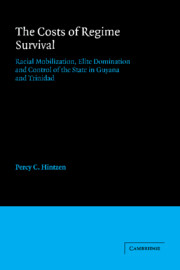 The Costs of Regime Survival
The Costs of Regime Survival Book contents
- Frontmatter
- Contents
- Acknowledgements
- 1 Regime survival and control of the post-colonial state
- 2 Mobilization for control of the state in Guyana and Trinidad
- 3 Maintaining control of the state: strategies for regime survival in Guyana and Trinidad
- 4 Elite support and control of the state: race, ideology,and clientelism
- 5 Regime survival and state control of the economy
- 6 The political and economic costs of regime survival
- 7 Collective needs versus the demands of powerful actors in less developed countries
- Appendix
- Bibliography
- Index
- Other books in the series
1 - Regime survival and control of the post-colonial state
Published online by Cambridge University Press: 08 October 2009
- Frontmatter
- Contents
- Acknowledgements
- 1 Regime survival and control of the post-colonial state
- 2 Mobilization for control of the state in Guyana and Trinidad
- 3 Maintaining control of the state: strategies for regime survival in Guyana and Trinidad
- 4 Elite support and control of the state: race, ideology,and clientelism
- 5 Regime survival and state control of the economy
- 6 The political and economic costs of regime survival
- 7 Collective needs versus the demands of powerful actors in less developed countries
- Appendix
- Bibliography
- Index
- Other books in the series
Summary
Introduction
There is a most serious dilemma facing political leaders engaged in the process of formulating and implementing national policy in less developed countries (LDCs). It emerges out of a conflict between the prerequisites for satisfying the collective needs of society on the one hand and the imperative of servicing the power, security, exploitative, and accumulative interests of metropolitan actors and their local allies, dependents, and clients on the other. The conflict pertains to conditions for political survival.
In an ideal world, the survival of political leaders should be linked to their effectiveness in promoting the generalized interests of the entire population and the developmental interests of society as a whole. Unfortunately, political survival in LDCs can depend on a leader's willingness to acquiesce to politically strategic international and domestic actors whose sole interests rest with their own wealth, power, and prestige. Such actors are intertwined in a web of international alliances. More often than not, the positions of power and influence of the small local minority among them derive from a willingness to protect and promote the economic, political, and security interests of metropolitan allies, partners, associates, and employers. In return, these local actors are provided with resources which allow them to dictate, determine and influence national policy if not directly to control the state.
Political leaders in LDCs are faced with the need to mobilize mass support without threatening the interests of these powerful and strategic actors. To do so, many come to depend upon their ability to appeal successfully to subjective sentiments.
- Type
- Chapter
- Information
- The Costs of Regime SurvivalRacial Mobilization, Elite Domination and Control of the State in Guyana and Trinidad, pp. 1 - 27Publisher: Cambridge University PressPrint publication year: 1989
